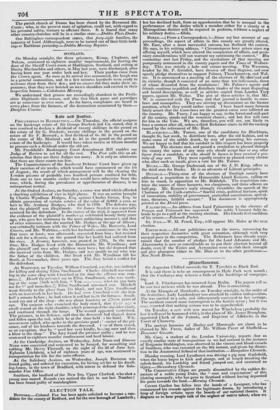/Lab) an gutitice.
PROCEEDINGS IN BANKaurrcv.—On Thursday, the official assignee on the bankrupt estate of Sir George Duckett and Co. stated, that it
was resolved to declare a dividend of twenty shillings in the pound on the estate of Sir G. Duckett; twenty shillings in the pound on the estate of Sir F. Bernard ; a first dividend of Os. 8d. in the pound on the estate of Mr. Morland ; and 4s. 4d. in the pound on the general estate of the bankrupts. It would have taken twelve or fifteen months • to procure such a dividend under the old act.
Mr. Freshfield's Bankruptcy Court Amendment Bill enables one Judge of Review to act for all the rest. The Post calls this an ad- mission that there are three Judges too many. It is only an admission that there are three courts too few.
The Commissioners of the Insolvent Debtors' Court have given up their vacation of six weeks, which would have commenced on the 1st of August ; the result of which arrangement will be the clearing the • London prisons of probably two hundred persons confined for debt, from one to two months earlier than would have otherwise been the case, which, during the prevalence or apprehension of disease, is no • unimportant matter.
At the Oxford Assizes, on Saturday, a cause was tried which afforded a shocking exhibition of vice in high places. It was an action brought
by Charles Wyndham Hodges, Esq. against Charles Green, Esq. to obtain possession of certain estates of the value of 3,0001. a year, as heir to Mr. Anthony Hodges, who died in 1799.. The defence was, that the plaintiff was illegitimate. Sir James Scarlett was especially retained for the defendant. In the course of the trial, it appeared from the evidence of the plaintiff's mother (a celebrated beauty forty years ago, who gave her testimony in the most unblushing manner), and that of other witnesses, that she married Mr. Hodges at the age of fifteen ; was criminally intimate with the Prince of Wales, Mr. Bouverie, Lord Craven, and Mr. Walthier,—with her husband's connivance in the two first cases at least; was afterwards separated from him ; but resisted his suit for a divorce, on the ground that her health had suffered from his vices. A divorce, however, was granted in 1795. In the mean time, Mrs. Hodges lived with the Honourable Mr. Wyndham ; and the plaintiff and two other children were born ; but she deposed that she received visits from Mr. Hodges, and was unable to say who was the father of the children. She lived with Mr. Wyndham till his death, at Newmarket, three years ago. The Jury found a verdict for the defendant.
At Worcester, on Tuesday, William Crawford, a nailor, was indicted for killing and daying Eliza Smallwood. Charles Aiitchell was work- ing in the same shop with Crawford at the time the offence was corn- Heard time prisoner say to Eliza Smallwood, who was work-
ing at the same 1:3ock with him, " You — what do you burn me for ?" and immediatt:y Eliza Smallwood screamed out. Mitchell went directly to the place from his block, and saw Eliza Smallwood with an iron stuck in her back. He hat! seen Crawford with the iron half a minute before ; be had taken it red-hot ii•.;:n the furnace. Small- wood ran out of the shop : she was about fourteen or ;U'±cen years of
age. The surgeon who examined the body stated, that ir.-Ls a small wound on the right shoulder, which penetnited the situ ulder-blade, and continued through the lungs. The wound appeared cauterized. The prisoner, in his defence, said that the deceased had slipped down and fallen upon the rod, which he at the time held :•1 his hand. Wit- nesses were called, who spoke to the previous good (-1 aucter of the pri- soner, and of his kindness towards the deceased. Cue of them stated, as an exception, that be " used her very kindly, bailing now and then a blow in the shop." The Jury found the prisoner guilty; and be was sentenced to eighteen months' confinement and hard labour.
At the Cambridge Assizes, on Wednesday, John Nunn and Simeon Nunn were convicted and sentenced to be hanged, for assaulting and robbing Mr. Henry Thurnall, on the night of the 2d of June last. Ephraim Litchfield, a lad of eighteen years of age, was sentenced to transportation for life for the same offence.
At the Salisbury Assizes, on Wednesday, Joseph Brereton was found guilty, and ordered for execution, for having set fire to his dwell- ing-house, 111 the town of Bradford, with intent to defraud the Sala- mander Fire Office.
Smithers, the landlord of the New Inn, Upper Clatford, who shot a young man named Bounds (we noticed the fact in our last Number) has been found guilty of manslaughter.


























 Previous page
Previous page